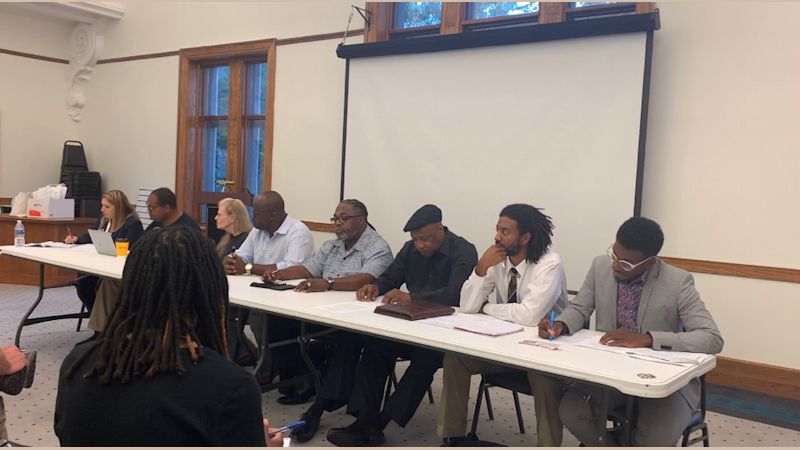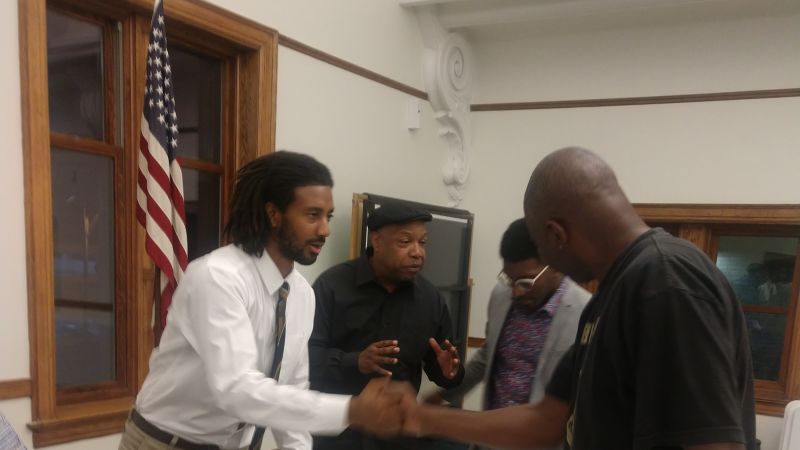Noticias de la campaña
Rachel Ventura engages activist and subject matter experts during lively discussion over the topic of criminal justice reform.

Rachel Ventura held an engaging round table discussion on the topic of criminal justice reform on Thursday, Sept. 12th at the downtown Joliet Library. About 40 people, largely an African American crowd, attended the event. At times audience members injected their opinions on various topics. The purpose of the event was to include activists, community leaders, experts and audience members in a discussion before drafting her final platform position. Topics for the 2-hour discussion ranged from re-entry to economic disparity, and the use of private prisons and prison labor. While not a focus, many panelists also discussed education system reforms.
Ventura began the discussion by highlighting the disproportionate number of African Americans in prison. “Nationally, over 40% of the incarcerated are black people, but only 12% of the United States population is African American,” she said. “These statistics should alarm everyone and highlight that there is a glaring problem with our criminal justice system.”
There were differences in views between panelists. During the discussion on wealth inequality, some members of the panel felt that economic barriers like cash bail should be significantly reduced or eliminated while others felt that the problems were largely non-economic. In answering a question about income disparity’s effects on prison populations, panelist, Bishop Steven Evans from Joliet said, “this disparity that we are talking about has always been and will probably always be about race and ethnicity. If I and a white guy, same financial background, go out and commit the exact same crime, because of the color of my skin, I might get 20 years whereas he might get 2 or 3 with probation.”
Evans did highlight some of the financial barriers to re-entry into society like parole-board recommended anger management classes and psych evaluations that cost $50 to register and $25/class for 14 weeks, an aggregate of $400. A member from the audience, Trista Brown, chimed in and said that those people who have ankle bracelets have to pay $50 per week for the home monitoring system. She said that many could not afford the weekly $50 and that missing a week of payment meant a return to prison.
Randy Ryder, a criminal justice reform advocate and community activist from Aurora said that economics play a significant role in the unjust system. “You will get as much justice as you can afford,” said Ryder. “The reason we are incarcerated more than anybody else is income and race. It’s a combination of both."
Dr. Vince Gaddis, also from Aurora said that we need to focus on some of the economic barriers like cash bail. “Income really comes into play when you can’t post bail… Once you are arrested, nobody has proven that you have done anything, but if you can’t post bail, you are incarcerated nonetheless,” said Gaddis.
The panel also discussed alternatives to prison. Nicholas Richard-Thompson, an Aurora resident and member of the Ventura policy team, talked about some of the benefits to restorative justice initiatives that are being experimented with in New York and Chicago. “What happens is you pay restitution, but instead of paying to a court system, you pay it to the person you harmed.” He felt it was a good system, but he thought that the underlying problems of why a person entered into the criminal justice system also needed to be addressed.
While discussing alternatives to traditional prison time, one audience member suggested that community service was a good idea that should be explored. “I look at it from the perspective of a parent. If my child or a young adult makes a mistake and it’s a low-level charge, I’d much rather have him do something where he’s giving back to the community at the same time he’s getting help to get the resources he needs to change going forward versus being caged up like an animal.” Another audience member, Robert, felt that free labor or community service was similar to slavery and should be avoided. Ventura turned the conversation to cheap labor in for-profit prisons.
In answering Ventura’s question, “do we ban all corporate, for-profit prisons like we have here in Illinois?” Dr. Gaddis talked at length about Corrections Corporation of America (CCA) and expressed strong opposition to private prisons and prison labor. He said it is an excellent business model for the private sector which pays prisoners 20 cents an hour and can generate enormous profits. “A third of the bullet-proof vests that our service members wear are made in prisons,” said Gaddis. “We need to take our eye away from profit and punishment and talk about restorative measures and rehabilitation.”
Gaddis said that CCA was adapting to the movement against for-profit prisons and said that they adopted a growth strategy to lobby congress to create more detention facilities for immigrants. “You know here in Joliet, there was a whole fight to build a 900-bed detention facility for immigrants,” Gaddis said. “The private prison industry is really writing a lot of policy and legislation that governs how we institutionalize and run these kinds of operations.”
A Joliet teacher, Ernest Crim expanded on the private prison issue. “The words, ‘for profit prisons,’ the focus is making money. If you want to make money you have to spend money running ads. So you spend that ad money, which is lobbying money, give that money to the politicians. Then they will create laws, more hoops, more barriers, more land mines in the hood to lock us up,” said Crim. “It’s like slavery has really never left the mindset of America. We just keep finding new ways to frame it. We just find different ways to disenfranchise black people.” All of the panelists agreed that some serious reforms that enabled ex-felons to re-enter society was needed, and a good portion of the audience chimed into the discussion.
Randy Ryder who spent time in prison described how tough it was for someone to find a good-paying job after they had been convicted. Ryder said, “being convicted of a felony is a life sentence.” He proposed a 4-step plan for ex-offenders to have their records permanently sealed. The steps that ex-felons would have to take include:
Completing parole, probation or any special board orders such as drug treatment or anger management classes They must obtain a GED or have a high school diploma They must be employed, seeking employment, or pursuing educational advancement They must not have any felony convictions following release Ryder admitted that some people will not change no matter what. “While there are some of us that get out and will do it again, there are others of us who want an opportunity to change,” said Ryder. “This proposal creates that opportunity and puts you on a level playing field.”
Garland Mays, a panelist and current President of the Forest Park Neighborhood Association, agreed, “when a black man is paroled from prison, he needs a way to make himself eligible for employment again.” Other audience members who worked at WalMart warehouses in Will County said that they lost their jobs when WalMart investigated their backgrounds. One of the warehouse workers, Mark Valentine, said his felony was from 1999 and he had worked every scheduled day for WalMart on time. WalMart took over the warehouse operations in January and had dismissed him by April. Later Valentine and another worker were allowed back to work, but only through a temporary agency at a reduced wage, and without benefits. Vince Gaddis suggested that Ryder’s proposal need to have a retroactive element that would accommodate people like Mark Valentine.
Towards the end of the discussion, Ventura stepped in to suggest that what we really need is to simply seal the record when you exit prison and declare that your time served is over. “Several weeks ago we discussed not going through the steps that Randy has laid out, but actually sealing the record from employers and from landlords. When you get out from a non-violent offense, it’s sealed, it’s done,” Ventura added. Many of the panelists agreed that time served should end once a person’s sentence was done.
When asked if incarcerated people should be able to vote, Ernest Crim said, “yes, but there is a contingency that wants to remain in power by any means.” He said that there is a need to educate people about their basic right to vote and make sure that people do vote.
Michael Childress, an audience member and President of the DuPage Chapter of the NAACP, a non-partisan organization, said that the voting booth is one place where we are all equal. “It boils down to democracy,” said Childress. “Until we recognize the value of voting, we are going to continue to follow that cycle, because if you don’t think your vote is important, why would they spend so much money to keep you out of the voting booth.”
Education reforms and disparities in our education system were frequent touch points for panelists and the audience. When discussing any realized savings from significant reforms, Garland Mays said, “when you speak about the $1.5 billion (referencing an ACLU proposal) I would like to see that money placed into education. It can be used to not only help those incarcerated afterwards to find job training programs, but it can also be used in our schools.”
Bishop Evans chimed in on the conversation, “there’s an elephant in the room that we have not really talked about, which is really my focus. I want to do some things that stop people from going to the penitentiary in the first place. It starts with education. I want more teachers that look like him [referencing Ernest Crim].” Ryder agreed that teaching people their basic 4th Amendment rights was necessary and emphasized that staying out of prison was a more important goal than re-entry.
Another panelist, Charolette Droogan, an activist from Bolingbrook and member of Black Lives Matter said that her focus is on making more white people aware of the need for meaningful criminal justice reforms. “One of my goals is to also save the souls of white America. It’s so disheartening that with all of the people who are working so hard to change things that things still remain the same. The warehouse workers 15 years ago still have the same complaints today.,” said Droogan. “What I would like to see is more and more white people who are in the background helping and supporting this cause.”

